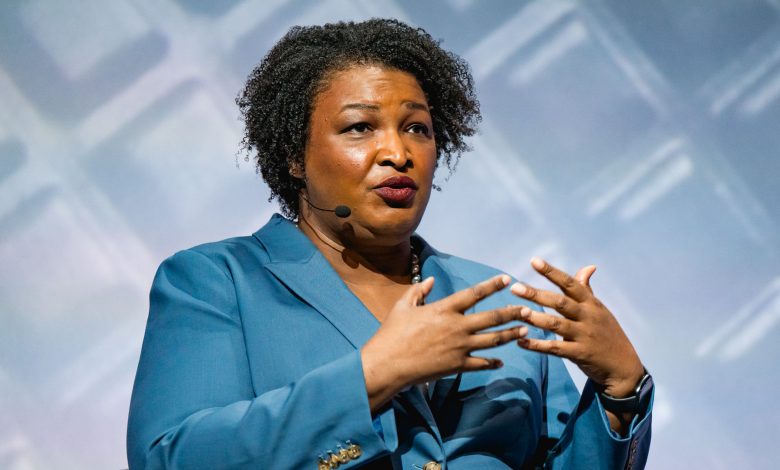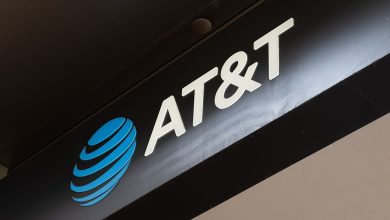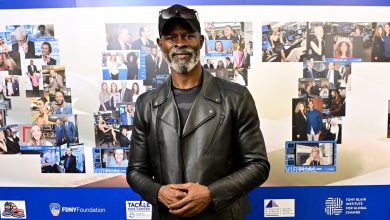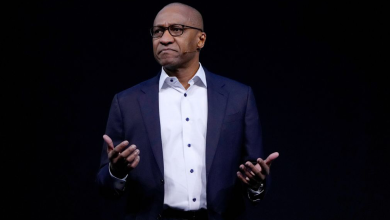Stacey Abrams Believes DEI Proponents Will Have To Do A Better Job Connecting Achievements And Advances – AfroTech

Stacey Abrams believes proponents of diversity, equity, and inclusion (DEI) will need to be better at communicating achievements and advances if it’s to be protected.
The Mississippi native’s sense of advocacy was shaped by her parents, who defied their economic circumstances by choosing to do good for others, she told AFROTECH™ in an email Q&A. This aligned with the family motto, “Having nothing wasn’t an excuse for doing nothing.”
“Purpose and power are not dictated by where you are but instead by how you situate yourself in a given place and moment,” she explained.
Reflecting on when she first understood the importance of standing in her truth and advocating for others, she shares that she was in second grade and defended her classmate against a bully.
“I defended a Vietnamese girl against a White kid who felt comfortable using his size and race as validators. I stood up to him — it helped that I was as tall as he was — and I was able to show Julie and others that we had the same right to be there, despite being visible minorities,” she said.
Her time at Spelman College, earning a degree in interdisciplinary studies, further nurtured her confidence to show up in the world as a Black woman. Abrams went on to become a trailblazer. She served as Minority Leader in the Georgia House of Representatives for 11 years and was the 2018 and 2022 Democratic nominee for governor in Georgia, according to a bio shared by Carleton College. She also made history as the first African American to lead the Georgia House of Representatives and serve as the gubernatorial nominee of a major party in the U.S.
Furthermore, Abrams is involved in a trail of organizations advancing social, economic, and political equity, and founded Fair Fight Action, Fair Count, and the American Pride Rises Network. These pillars have all been under attack and are now under greater scrutiny as a result of negative perceptions of DEI.
As AFROTECH™ has reported, the Trump administration moved to eliminate DEI roles, policies, and initiatives, even withholding funding from colleges that continued to uphold them in enrollment and programming. An internal memo and spreadsheet from the U.S. Department of State, dated Nov. 10, reveal a proposal to remove 38 universities from a federal research program for upholding DEI hiring practices or for maintaining DEI objectives for considering candidates, The Guardian reports. These include Stanford University, Yale University, Johns Hopkins University, Duke University, and the University of Southern California.
Not listed for removal is the University of Texas at Austin (UT Austin), which isn’t a surprise as the University of Texas (UT) System put a stop to DEI policies across its 13 campuses in 2023, according to Insight into Academia. UT Austin had also eliminated various staff who worked in DEI-related roles, per WRAL News. Columbia University, MIT, University of Michigan, University of Pennsylvania, and University of Virginia are also proposed to stay in the program.
“DEI is embedded in the DNA of America, and its history is as long as the project of this nation. It informs education, the economy, and our elections processes, and the values of diversity, equity, and inclusion are guiding principles for developing a pluralistic democracy. DEI is the pillar of our nation’s multicultural success, which is why opponents are so eager to demolish it — to eliminate competition and restore uniformity, unfairness, and exclusion,” Abrams explained.
She also notes that DEI has been used as a buzzword since 2020 and, by 2023, had even become an epithet. She believes the term is often misconstrued, partly because its proponents have not communicated its meaning effectively.
“Our opponents understand its power: from civil rights to human rights to economic access. However, proponents have not adequately done the job of connecting the dots between DEI’s achievements (like the ADA — Americans with Disabilities Act — or Title I education) and our advances as a society,” Abrams expressed. “We have to now teach people what we thought they understood, which is a tough but achievable goal.”
DEI shouldn’t be dismissed. She believes it needs to be championed and advanced as it will be necessary to inform decision making, decrease harm, and guide innovation for the future.
“It is how we protect our communities, and it is also how we create the nation we deserve — which is only successful if people have economic power, civic power and individual power. The interconnection of the political, social, and cultural is the engine of society — without intentionality around the principles of diversity, equity, and inclusion,” she explained.
Abrams reaffirmed her stance on DEI at the AFROTECH™ Conference 2025 during a conversation moderated by Dr. Rachel Gillum, vice president of ethical and humane use of technology at Salesforce, where Abrams also discussed AI’s role in democracy. She shared similar insights directly with AFROTECH™.
“Without regulation and oversight, as well as literacy about the limits of these tools, AI and digital media can be weaponized against communities,” Abrams explained in the Q&A. “Our role is not to limit innovation or access, but instead to ensure that people feel empowered to use these tools, and that the tools themselves are trained to benefit the communities they touch. Issues like intentional training on DEI and thoughtful digital privacy rights are not nice to have — they are rudimentary and vital for ensuring equity.”
This is why AFROTECH™ Conference exists. It combines workshops, networking, job opportunities, and conversations all centered around the latest in technology. Abrams spoke on the merit and importance of the AFROTECH™ Conference, which will return to Houston from Nov. 2-6, 2026.
“Innovation is rarely a singular achievement — we remember the first name on the patent, but many others contributed. Events like AFROTECH™ serve as a catalyst for connection, debate, and discovery, which is how we find the support we need and develop the skills to do even more,” Abrams mentioned.

Feeling FOMO? Don’t miss another AFROTECH™ Conference. Secure your early bird ticket now for 2026.




